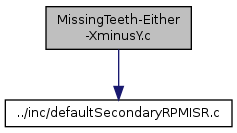Missing teeth, M-N, with or without cam sync, configured externally. More...
#include "../inc/defaultSecondaryRPMISR.c"

Go to the source code of this file.
Functions | |
| void | decoderInitPreliminary () |
| void | perDecoderReset () |
| void | PrimaryRPMISR (void) |
| RPM ISRs, IC timer for engine position and RPM. | |
Variables | |
| unsigned char | NumberOfTwinMatchedPairs |
| unsigned long | lastInterEventPeriod |
| match | matches |
Detailed Description
Missing teeth, M-N, with or without cam sync, configured externally.
This file is generic, and built as an include with multiple headers containing the parameters required to make it function.
Documentation on how this decoder was designed & written is available here:
http://forum.diyefi.org/viewtopic.php?f=56&t=1340
Definition in file MissingTeeth-Either-XminusY.c.
Function Documentation
| void decoderInitPreliminary | ( | void | ) |
- Todo:
- TODO Perhaps use some of the space freed by shrinking all timing tables for this: /unsigned long wheelEventTimeStamps[numberOfWheelEvents]; // For logging wheel patterns as observed
Definition at line 60 of file MissingTeeth-Either-XminusY.c.
References TCTL4.
| void perDecoderReset | ( | void | ) |
Definition at line 65 of file MissingTeeth-Either-XminusY.c.
References NumberOfTwinMatchedPairs.
| void PrimaryRPMISR | ( | void | ) |
RPM ISRs, IC timer for engine position and RPM.
There are multiple copies of this interrupt handler, each is linked with the rest of the code once such that if there are N decoder implementations and/or variants, then there are N loadable binaries produced after a full build.
For details on any specific decoder implementation, see the documentation for that specific file.
Definition at line 70 of file MissingTeeth-Either-XminusY.c.
References decoderSetting::accelerationInputEventTimeTolerance, ADCBuffers, angleOfSingleIteration, BackwardNarrow, BIT0, CALC_FUEL_IGN, Clocks, coreStatusA, Counters, KeyUserDebug::currentEvent, DEBUG_TURN_PIN_OFF, DEBUG_TURN_PIN_ON, decoderSetting::decelerationInputEventTimeTolerance, DECODER_BENCHMARKS, KeyUserDebug::decoderFlags, fixedConfig2::decoderSettings, edgeTimeStamp, eventAngles, fixedConfigs2, KeyUserDebug::inputEventTimeTolerance, KeyUserDebugs, LAST_MATCH_VALID, LAST_PERIOD_VALID, LAST_TIMESTAMP_VALID, LAST_TPD_VALID, lastEventTimeStamp, lastInterEventPeriod, twoPairs::lastPair, lastTicksPerDegree, MaskBySumPattern, MatchedPair, MatchedPairMatchedPair, MatchedPairNarrowWide, MISSING_TEETH, decoderSetting::missingToothTolerance, NarrowBackward, NarrowWide, NarrowWideWideNarrow, NBIT0, noiseAppearedWayTooEarlyAsIfItWasAVRToothButWasnt, NUMBER_OF_WHEEL_EVENTS, numberOfRealEvents, NumberOfTwinMatchedPairs, OK_TO_SCHEDULE, match::pairs, match::pattern, PORTB, PRIMARY_EVENT_ARRIVED_TOO_EARLY, PRIMARY_EVENT_ARRIVED_TOO_LATE, KeyUserDebug::primaryTeethSeen, PTIT, resetToNonRunningState(), sampleEachADC(), SET_SYNC_LEVEL_TO, Counter::syncedADCreadings, TC0, TFLG, TFLGOF, twoPairs::thisPair, ticks_per_degree_multiplier, ticksPerDegreeRecord, LongTime::timeLong, Clock::timeoutADCreadingClock, timerExtensionClock, LongTime::timeShorts, timeStamp, WideNarrow, WideNarrowMatchedPair, yourSyncToleranceIsLooserThanAWellYouGetTheIdea, yourSyncToleranceIsTighterThanAWellYouGetTheIdea, and yourVRSensorHasALoosePlugFixIt.

Variable Documentation
| unsigned char NumberOfTwinMatchedPairs |
Definition at line 55 of file MissingTeeth-Either-XminusY.c.
Referenced by perDecoderReset(), and PrimaryRPMISR().
| unsigned long lastInterEventPeriod |
Definition at line 56 of file MissingTeeth-Either-XminusY.c.
Referenced by PrimaryRPMISR().
| match matches |
Definition at line 57 of file MissingTeeth-Either-XminusY.c.
 1.8.1.2
1.8.1.2